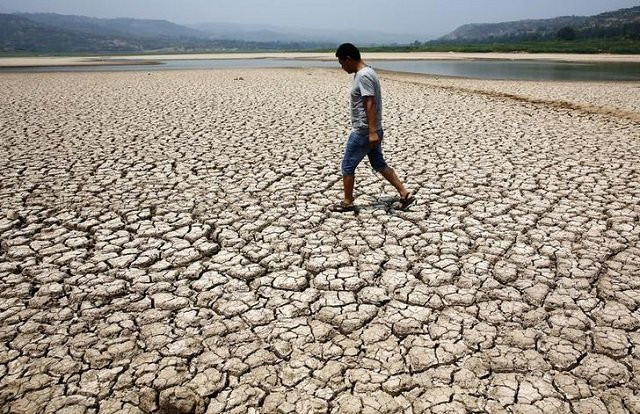75% of world population could face deadly heatwaves by 2100: scientists
Human activity making climate change 170 times quicker than natural process, says study

A man walks through the dried-up bed of a reservoir in Sanyuan county, Shaanxi province PHOTO: REUTERS
Scientists researched and found that there were about 1,900 places around the world where people's death had been a result of extreme heat and humidity, the Independent reported.
Places included Moscow, where 10,800 deaths took place in 2010, Paris where 4,900 deaths took place in 2003, and Chicago, where 740 deaths took place in 1995.
Researchers suggested that one-third of the population was exposed to 20 days or more of deadly heat conditions, on average. However, the figure is expected to rise to 74 days if carbon emissions continue at high levels, scientists warned.
Even the "most aggressive" greenhouse gas reduction plans would still affect more than 47 per cent of the population by 2100.
Pakistan hopes for UNDP aid in setting up institutions under Climate Change Act
The climate is evolving at such a fast pace that humans will eventually adapt to higher temperatures more easily. A study also found that human activity was making the climate change 170 times quicker than its natural process, resulting in problems for plants and animal species.
A paper published in the Nature Climate Change journal said the research “underscores the current and increasing threat to human life” by global warming.
Lead author of the paper, Professor Camilo Mora, of the University of Hawaii at Manoa, said "For heatwaves, our options are now between bad or terrible. Many people around the world are already paying the ultimate price of heatwaves, and while models suggest that this is likely to continue, it could be much worse if emissions are not considerably reduced."
Most LG officials in the dark about climate change
Researchers suggested that humans can survive temperatures up to 37C (98.6F) if they sweat, but this process becomes ineffective when the air is highly humid and prevents sweat from evaporating. Hence, heatwaves in humid areas can cause death at temperatures lowers than 37C as well.
Ageing populations will also be more vulnerable to climate changes while increased urbanisation could "exacerbate heat-island effects," researchers wrote.
The head of climate and energy policy at WWF-UK, Gareth Redmond-Kind, said the paper was a reminder of climate change's impact on humans and that "it will get even worse." He emphasised the need for global action to protect humans from climate change.
This article originally appeared on The Independent.












1724319076-0/Untitled-design-(5)1724319076-0-208x130.webp)






COMMENTS
Comments are moderated and generally will be posted if they are on-topic and not abusive.
For more information, please see our Comments FAQ